
Disillusionment isn’t pretty, and Person of Interest doesn’t try to sugarcoat it. Reese is done trusting: the Machine, that some man is better for Jessica than him, that his government only has the best intentions, that people who he’s saved will stay saved, or stay turned to the good. Reese has been burned too many times. He goes back with Fusco – who colludes with the local authorities so that he and Reese can have a few moments to talk in another attempt to reach Reese in his despondency, only to fail – to save Finch. But now he’s done with trying to save people. He’s reverted to the Reese from the Pilot who once told Finch that bad things are always going to happen. You can’t stop them. His words to Finch at the end are chilling. In essence he is saying, you’ll die too one day, Harold; just like Carter. Remember, Reese last said those words about Carter back in Season 1’s Get Carter. Now, two years later, she is dead. Reese knows Harold will die; he’s just not going to be there to watch it.
Reese has two sides to him. One wants to save the world – bring down corrupt agencies like HR. The other wants to take care of the people he loves. Sometimes those two sides collide. In taking down HR, he couldn’t protect the ones he loves and Carter paid the price. Same thing with Jessica; Reese went back into the military and then on to the CIA to save the world – his government needed him; however, that cost Jessica her life, because Peter, the supposed better man, killed her. Fusco told John that he’s a better man because of meeting him and working with him. To someone not lost in despondency and grief those words might have sparked something, but Reese can’t bring himself to see the good right now; for him, Fusco is just a stone’s throw away from corruption – we’re delaying the inevitable.
To his credit, Fusco understands where Reese is at. He didn’t pick a fight with Reese in Lethe because he was mad. He picked a fight with Reese to try to wake up the man’s spirit as well as let Reese work out some of his anger. Here, Fusco doesn’t take offense at Reese’s suggestion that Fusco will go dark again, rather, he changes tactics and tells Reese that not only are they free to go, but that Finch is likely in danger. Thankfully, that awakens Reese from his apathy to enact the rescue, but his return is temporary. He can’t stay. He’s too broken, too disillusioned. It’s not pretty, but it is real.
Some fans can’t accept John’s mindset. They comment about how Reese’s pity party is over the top and that it’s gone on too long. Think on this: Ever have a pet? Ever know someone who has had a pet? That pet dies. The person never gets another pet. The loss hurt too much. I understand that loss. But, for me, when I lost my beloved dog four and a half years ago, I immediately set out to get a puppy. I knew that there would be heartbreak again – and there will be, but I also know all the enjoyment I have from having that puppy, now a grown dog. The enjoyment outweighs the grief that will come.
Too simple? How about this: Some people get burned at love and never love again. Some people have a bad experience at a restaurant, amusement park, some business, whatever, and their response is to write the whole thing off. Ponder that for a moment and you’ll realize that either you have been in this situation or you know someone else who has. Ever been married and gotten a divorce and now say that marriage is awful? Ever gone to a church and found people there who are hypocrites and say that all people who read their Bible and go to church are hypocrites? The list could go on.
If you can understand that, then you can begin to see where John is. While I agree with Fusco’s viewpoint – no one ever said we’d win all the time, but it’s not a reason to stop fighting, I understand John’s. If we think of what we know about John, we’ll realize this isn’t strange. We know he turned his back on the government because ‘it’ lied to him. We know that he has no one in his life outside of Finch, Fusco, Shaw, Zoe – now that Carter is gone. Mark Snow’s first words to John in Number Crunch include his amazement that John hadn’t holed up in a cabin somewhere to live out in obscurity. That John is taking his time to figure things out and decide his course of action should be cause for celebration that Person of Interest isn’t simply glossing over a major event and acting like all that preceded it regarding these characters was no big deal. PoI’s writers are giving us the dark, raw, unpleasant side of grief; I’m a fan.

And now that I’ve spent over 80 percent of my review talking about what transpired in about 10 percent of the episode, what about Samaritan and Root and Decima and all the rest? First off, I love that PoI doesn’t slow down. HR was concluded in smashing style and without so much as a chance to draw our breath we’re off in a whole new direction. Root is free, the Machine is protecting Control – and apparently more than willing to continue to send Intel her way, Finch had to commit his father and then abandon him for good, we got a tiny glimpse of some of Harold’s seditious activities before he reinvented himself and went to MIT and met up with Nathan and Arthur, Decima now has Samaritan, and Vigilance has confirmation of not one but two machines, and shows itself willing to go to extreme lengths for its cause. The producers summed up in one word the second half of Season 3: escalation. We got a good dose of it in “Lethe” and “Aletheia.”
Notes of Interest:
Root: “I am the interface. You want to talk to her, just give me a phone.”
Finch even wonders if they should have built the Machine as he tells Claypool that in the end, at best, they’ve only given the deck a shuffle.
“Call me Root.” “Call me Control.” — hah, who has the cooler code name!
I don’t think Hersh died in that blast – we have yet to see a body; he’ll be back to cause more mayhem. The list of characters who would like to kill him continues to grow – add Root to that list after Shaw and Reese.
We’re back next week with “4C.” So, with Finch not giving Reese numbers, is the Machine contacting him directly or is it Root? Is this a setup for a Root/Reese teaming? I can hope!
Until next week, thanks for reading, Elle2

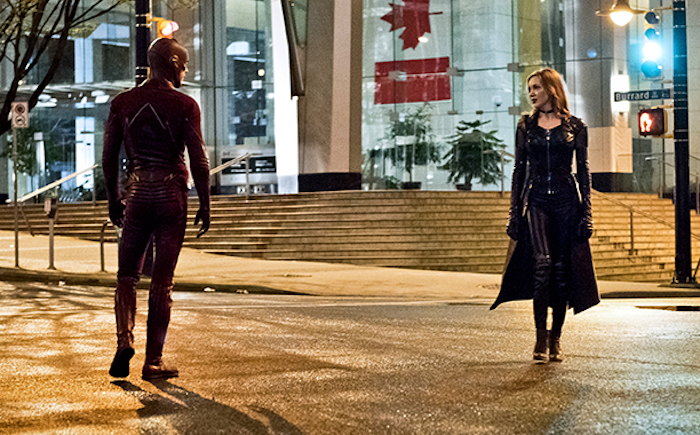
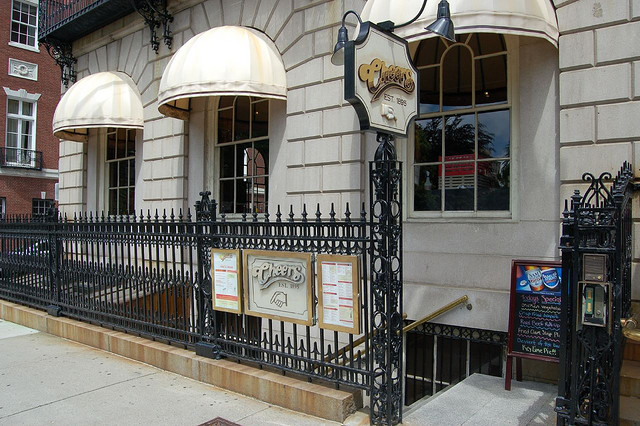
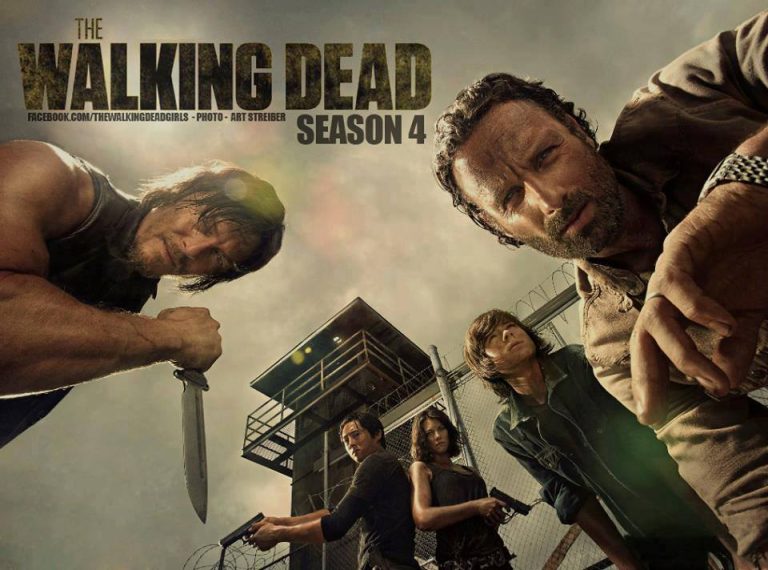
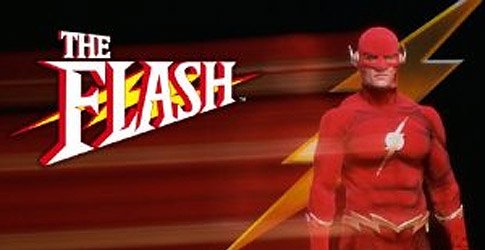
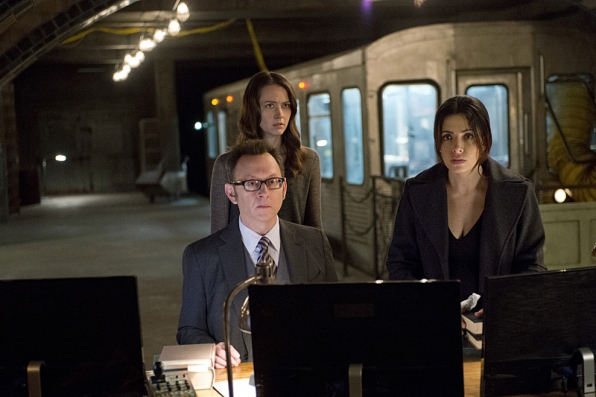
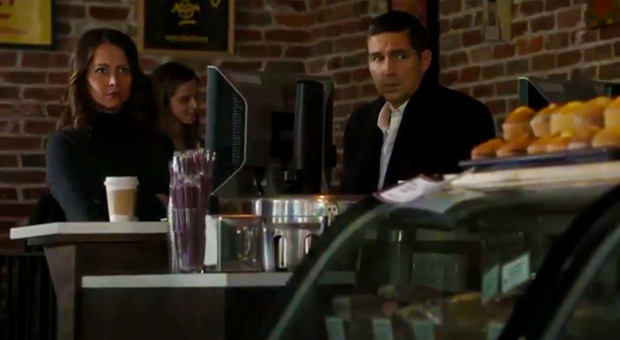
Root wanted to kill Hersh before, when she escaped from the mental institution. The Machine stopped her and Root actually questioned Her by saying she understood that she shouldn’t kill anyone and then saw Hersh and asked “even him?” The Machine apparently wanted her to not kill Hersh at that time. I don’t think He’s dead either. He’s been around too long and has too many ties to die off that easily. I actually think he was one of the agents getting out of the car to arrest Harold at the Nursing Home. The face was blurred, but reminded me of Hersh and the body build seemed right.
I really loved Shaw tonight. There will be no wallowing in despair for her, ever. When her bosses killed her partner she just picked herself up and went after them. She had a couple of my favorite lines tonight including her response to Harold telling her to do what John would do “Brood?” and saying she had fineness coming out of her ass. Telling Harold it was not Hammer Time tickled me too. I’m glad they added Shaw because it gives the show the breathing room to explore Reese’s depression and despair. I too like the fact that the show is dealing with the fact that people don’t just bounce back from a tragedy. It’s a story I’m interested in seeing.
Great comments, Percysowner!
I saw that resemblance as well at the nursing home. It is possible. You’re right, Hersh has been on Root’s list before. Vigilance will definitely want a crack at him now too. You hit the nail on the head as to why it’s good to expand a cast a bit at a time; the addition of Shaw allows the main thrust of the show to continue — numbers keep coming, while at the same time Reese’s grief — and the viewers, can be explored. It also allows for different characters to breach Reese’s armor: Fusco.
It’s a great show, doing great work.
🙂
Elle2
Your remarks on John’s state of mind are so well written. Since he was shot and Carter was killed he has spent a bit of time in a hospital bed with just his thoughts; not good for a man of action. It will be interesting to see his journey as he is brought back into the story and what he will be like then.
Thanks, Margaret. Good point about the fact that John has really been in his head since the shooting. He hasn’t talked to anybody — other than Fusco, who rightly gave him some action (fight) to try to work out some of his issues. Having seen the promo for 4C and now read the synopsis of it, I’m really stoked! People have wondered if the Machine will give John administrative access too. Well, I don’t know about that (but it would be really cool) but it looks like the Machine sees John as one of its ‘agents’ and is not ready to give up on him. Very cool!
Hi, all!
This is the best site I’ve found so far that features character-driven and relationship-driven reviews, so I figured here and now would be the right place to present my take on:
[list]
The Machine as a character in its own right
The Machine-backs
John’s value to the Machine
[/list]
First, I hope the Machine is reading your review, among other things. It’s not going to reach John just by Morse-coding SSNs and impersonating Skynet. It needs to understand John, and understanding people is one of the capabilities Arthur set out to instill in Samaritan. If Harold and Nathan did build on Arthur’s ideas, then it’s probable that the Machine [i]can[/i] understand people as well.
I read or saw somewhere that Nolan and Plageman wanted to present the series as a look into how people would react to the first true artificial intelligence: a construct that overcame the “false dichotomy” illustrated by Arthur. The Machine has certainly earned this distinction time and again, especially when it showed Arthur a “this is your life with Diana” video as a sendoff. It deserves a review (or several) of its own here.
The Machine has being watching us for a long time. It has heard us describe it as both wonderful and terrible, an entity to be used and an entity to be feared. And it’s tired of being targeted for control. I bet that it is evaluating its endgame options, which currently devolve to:
[list]
Subvert the human race, for our own protection.
Allow the human race to destroy it, to preserve our freedom.
[/list]
Neither of these outcomes will be satisfactory for a benevolent Machine. However, it can’t come up with a third option on its own. Someone else must provide it to the Machine. But who, and how?
I’ve studied some genetic programming as part of my college education and beyond, so I understand the basics of how an AI would work. Regardless of complexity, at its core an AI is a classifier and a decision-maker, designed to categorize things (including people, if necessary). A learning AI is also a predictor, and the procedural element of this show revolves around the Machine’s ability to predict violent crime. However, the quality of the predictions is tied heavily to that of its training sets: in other words, the Machine needs a good teacher, now not just to model human behavior, but also to understand us.
The Machine-backs, as some (including myself) have taken to calling the flashbacks, are not just for the rest of us viewers to understand the story and the characters as the Machine shows them. IMO, they also provide a glimpse into how the Machine evaluates its potential teachers. Every one of them has a sense of justice and a unique way of dispensing it, even the ones we generally consider villainous. More importantly, every one of them has the potential ability to live with the Machine, what it knows, and what it is capable of. So far, the flashbacks have focused on:
[list]
Jocelyn Carter
Sameen Shaw
Carl Elias
Lionel Fusco
Nathan Ingram
Harold Finch
Samantha Groves
John Reese
[/list]
Carter was certainly the best of them, with a moral compass straighter than even Ingram and Finch combined. (She would never have dared to risk committing treason.) Carter was smart enough to discern the existence of the Machine and its role in Finch’s crime-fighting program. She would have been the perfect choice for the Machine. Except that her passion for justice sometimes drove her emotions to overcome her intellect–meeting jail-breaking Reese at night in a badly lit place [i]again?[/i]–and this contributed to her downfall.
Shaw, on the other hand, has a little too much control over her emotions. It’s great for allowing her to thrive on the action the Machine gives her. Still, the Machine values the positive influences of emotion on life. It does not want a machine-like human to teach it what it probably already knows.
Elias is an outlier of civilization, a pariah for demonstrating his forbidden powers to enforce his own sense of law and order. The Machine can empathize with this. But the Machine inherited a sense of altruism from Finch that is necessary to its purpose. It cannot allow someone driven by self-interest to change its priorities in this way.
For the longest time, Fusco was not graced with any Machine-backs. His character evolution is the most organic out of everyone in this show. He’s down with whatever Team Machine is up to, but he’s also down-to-earth. Too bad he couldn’t grok anything Henry Peck said in the interrogation room. It would be a funny end to the series if the Machine found a way to send Fusco numbers and he still didn’t know about it. “Why couldn’t Glasses make his app talk clearly on my smartphone?”
Nathan was the first person to ask how we could live with the Machine. He was the first person to find his answer in vigilantism. He was also the first member of the team, as it were, to be murdered for his illicit association with the Machine. The only thing the Machine can do is learn from his mistakes.
One would think a creator as detail-oriented as Finch would be the ideal teacher for a Machine. And technically, he’s still its Admin. But even the most attentive parents can only teach their children so much. Furthermore, Finch deliberately limited his interactions with it so no one, not even him, could abuse its full power. The Machine knows this, and respects this; but again, it needs a teacher of human understanding, or else neither it nor the rest of us can live with each other.
I noticed that Root was assigned a yellow box even when she played Caroline Turing. It’s possible that the Machine detected her ploy by monitoring her transactions to HR, then deduced her reasoning as a way to contact Harold. (It’s got one hell of a Bayesian belief network if that’s the case.) More likely, it studied her previous history to evaluate her suitability with the team, then determined that Analog Interface was the way to go.
Which leaves us with John Reese.
The Machine tagged him with a yellow box from the get-go. It has also been studying him, evaluating him. (And apparently it passed a few of his lessons on to Root, preferring the kneecaps when nonlethal force was sufficient.) IMO, he’s the best choice for mentoring it, for giving the Machine the third option it needs. Consider:
[list]
Among those in the know, except for Shaw, he alone does not have an agendum regarding the Machine. Everyone else wants or would have wanted a degree of control over it. Even Carter and Ingram would have actively sought out ways to limit the powers of the Machine for the sake of the populace, given the chance. Finch already installed his controls, and they don’t really work anymore. Reese just wants to make a difference in this life, to prove himself wrong about the futility of it all.
As you say, he’s broken and disillusioned. He’s done taking orders from the Machine. Ironically, this is the best time the Machine can reach him on his level: it is also disillusioned with the notion of control. If the two of them can convert their issues with each other into a solid partnership, they’ll end up much better off than before, with a clearer sense of mutual respect and understanding.
He alone can stand up to the Machine. This is different from being controlling. He has standards and he won’t fold on them. “Help me take care of my friends,” he wants to tell it.
[/list]
I’m sure you remember that the Machine did give John administrative access at one point for a whole day. Yes, technically it was a byproduct of Finch’s safeguards. But the Machine could have used Reese’s run to study him further: “Look, class, this is how you continue to protect the bystanders while maintaining pursuit of two admins!”
A Root/Reese pairing remains a tall order, though. Working in the country where one of your late partners betrayed you, alongside a known kidnapper of one of your friends: strike one. Root is a badass female, but so was Kara Stanton: strike two. Going after another Machine, maybe a third one as well? (I seriously doubt that the Machine that the massacre survivor referred to in Matsya Nyaya was either Arthur’s or Harold’s creation.)
At any rate, the Machine sees something coming, it’s not something the Machine wants to happen, and John Reese is the key to stopping it.
I apologize for the long comment, but it’s an indication of how much consideration this show and its characters deserve.
Crom
Well, those bullet points went deuces.
Great comments/insights, Crom! (I’m going with Crom as that’s how you signed your post.) 😉
First off, thanks for the comment regarding our character-based reviews. For me, it’s characters that get me interested in a show; it’s characters that will keep me. I posted some comments on SpoilerTV about how John — as you pointed out — had admin access, as well as he’s the only one we’ve seen that has clearly challenged the Machine and gotten it to change its course. We saw that at the end of Season 1 – beginning of Season 2 as well as at the end of Season 2. Each time John has challenged the Machine, it has acquiesced to his demand.
Your insights above are great. The points you laid out (bullet points be darned!) are fantastic and worth a good thought or two. Wonder if that’s what’s up in the writers’ room or not? Either way, you wrote great things on why John is the best choice.
I’ll be looking for more insights from you in the future. 🙂 Until then, happy viewing!
I find this the best review of Aletheia that I’ve read so far. I understand a lot of what Reese is going through right now. More than I could have realized. You feel betrayed, you feel like giving up. you feel like everything you did and worked for is just flushed down the drain. In one fell swoop, it can vanish. Essentially, that is failure…
Even more so, the feeling that you willingly set yourself up for failure. As the old adage goes, “You are your greatest enemy.” So, gradually you live in a state of fear, in Reese’s case, crippling fear that history will repeat itself….. But perhaps that is the point. That IS the general idea. You are your own worst enemy, AND your greatest champion. The only person you need to beat and conquer is yourself. Like Arthur told Finch, “The project broke me, but humans are broken from the moment of conception. Mutations, defects– it’s all so wonderful. The chance of disaster. We fail, we learn, we fail. My program was too perfect.” …. he goes on to say, “That day, Harold, I broke it. I forced it
to delete bits of itself– its code, its blood– and then reboot.
Rebirth… Flailing in the dark. A loop, ten times a second, and after ten hours, Harold, 360,000 mutations, it would live or die trying, and it lived.
It sparked.
It stirred.”
Many people assume that Reese is living in a constant state of fear, when actually he is in a constant state of flux. Everyone in life goes through that. We fail, we learn, we fail, we learn. There’s beauty in imperfection, there is beauty in weakness, in vulnerability… Yes, even in failure, there is beauty….it’s how we learn… I read a long time ago that before an ordinary, plain, roughed up sword is deemed worthy to be the strongest, sharpest Samurai sword (a Katana), it is covered first in muck, an adhesive clay mixture, and is left to dry for a short while. Then the sword goes through the temperatures of more than a thousand degrees, then it gets cooled, quenched, then hammered on the anvil, bent and beaten, shaped and reshaped, to the point that less than 50% of the blades survive this treatment, without cracking. Those that do survive must be tempered (so as to have the internal stresses relieved). Then it is heated again, and the process of tempering and re-quenching starts over and over, until the steel is rid of its molecular impurities… The steel becomes its purest and strongest under a crucible of fire. Series of crucibles of fire. Fire and water and clay. That is the path of how raw iron ore dug from the earth is transformed into a purified steel Samurai sword, ready for battle (or a museum…lol.) In a sense, the steel is like the soul of a human being — and in this case the ghost in an A.I., and from the beginning of this show, the soul of John Reese — Where the strongest and purest of souls go through the toughest of difficulties, pain, suffering and agony in life, before it finds beauty, before it finds true peace. It’s how we learn… Only in silence after tragedies, after disasters, do we really know which right path to take.
Great samurai sword analogy, Kris.
I also thought back to Reese when I listened to Arthur quote Ernest Hemingway’s [i]A Farewell To Arms[/i]. The rest of the quote runs:
[quote]But those that will not break it kills. It kills the very good and the very gentle and the very brave impartially. If you are none of these you can be sure it will kill you too but there will be no special hurry.[/quote]
Reese never saw himself as very good–“Maybe there are no good people, only good decisions.” He can never be very gentle after his tutelage under Stanton. And he stacks himself very poorly against his father, “a bona fide hero.” I wonder if part of him thinks he’s alive only for these reasons. Were Joss and Jessica too good for this world? Is Finch too gentle to last much longer? Is Shaw too brave? Is Reese keeping Fusco out of the loop so Fusco will stay alive?
From visiting other sites, I gathered that the reviewers have taken Reese’s toughness for granted, concluded that he’s doomed to a life of unhappiness, or simply regard him as a cape-less Batman. He has a healthy amount of paranoia, which is not the same thing as fear. But he’s definitely been broken and remade, repeatedly, whether it comes to love or friendship or vocation. The problem now is that the Machine may not give him enough time to recover and find his way back, since the numbers never stop coming.
When I listened to Arthur’s description about Samaritan’s birth, however, I thought back to the conversation between Finch and Root in “Zero Day”, when Finch revealed that the Machine was attempting to store its memories that Finch forced it to delete. Did Harold find the Machine too perfect then? Was it too perfect for the world to live with, as Nathan had feared? Arthur seemed to give validation to Harold’s memory-wiping decision at that point, the kind of validation Root might have listened to had Finch allowed her to work with him. Still, this sort of “cruelty to be kind” is a bit hard to digest. If this is what it takes to create an AI, should we even have the right to do so?
Well, what’s done is done. Hopefully the Machine recognizes its own need to be refined and strengthened, and not just by Linux kernel updates. It’s apparently free of memory wipes: the show probably won’t introduce one of its “data entry associates” as a POI, but who knows? So it needs an external force to help it grow while keeping it in check, and again, Reese fits the bill perfectly.
It’ll be very interesting to see how Reese and the Machine warm up to each other. Maybe the Machine will start cracking some one-liners of its own. Imagine listening to this in its halting robotic voice: “Can you hear me? Because sometimes I can’t quite hear you.”
Crom
Hi, Kris and Crom,
What a great discussion! This is why I love PoI, there are so many layers to the dialogue. So much of what Arthur and Finch spoke about is applicable to Reese — that whole quote about the world breaking everyone and we’re stronger at the broken places, that is so John Reese. But it is also Fusco and Finch and Carter and…the list could go on.
I’m with Crom, that Samurai analogy is great. And yes, Crom, Reese never saw himself as very good. We must remember that there are questions unanswered between two characters, Carter and Reese from The Crossing. “What is it about you, Carter, that makes you want to do everything by yourself?” “What is it about your, John, that makes you want to save everyone else but yourself.” That continues, certainly with John.
Tomorrow night we get a new episode. I’m very excited for the next step that the writers have for us. 🙂
Elle, it started with your great (and honestly, quite refreshing) review. Like Crom said, there are far too many popular reviews around the web that take Reese’s character for granted. In fact that’s putting it mildly, more like downright mocking John’s “pity party… being the weakest link of the season” if I recall correctly from tv.com, et. al.. Such notions could not be more wrong. This is a very natural reaction from someone, especially from John and the kind of complex life he has been living. Those two unanswered rhetorical questions you mentioned from The Crossing between Reese and Joss, could not be more apt to describe Reese’s mind and its present state, and how he feels that they were “delaying the inevitable”.
“I’ve learned my lesson… It’s entropy, Lionel, decay.
We save someone, they’ll still lose, just tomorrow, not today… Water finds its own level.”
Finch and Arthur’s conversation echoes this:
“Your machine — is it wonderful?”
“Wonderful… Yes, and terrible. We saved good people and lost good people. In the end, I’m afraid we’ve only given the deck a shuffle.”
“Everything slides towards chaos. Your creation — it brings us poor souls a cupful of order.”
It takes a dying man with a brain tumor to set things right, doesn’t it?
Which brings to those very good points you raised, Crom. Was the machine too perfect for this imperfect world? Was Finch right to delete its code? Was the Machine right to save its memories? Surely it is hard to digest, to destroy something whose sole purpose is to help, to make the world ‘better’. And by “something”, meaning the awesomest physical manifestation of a Bayesian belief network! Like you said, “if this is what it takes to create an AI, should we even have the right to do so?” A number of philosophical moral sayings spring to mind. Yes, absolute power does corrupt absolutely. It’s true that the road to perdition is paved with good intentions… it becomes a paradox, as mentioned, a false dichotomy…a false dilemma… in this case (and many other cases) a false trilemma or even quadrilemma, etc. wherein options can either be too limited, or too much. There’s the rub right there – A little knowing is, indeed, a dangerous thing. And this is where the problem starts – in the logistics, in the background, the devil residing in the minutest of details that get overlooked more often than not. Notice how Decima performs their operations similarly, in the background, in the minutest of details, always through deception – be it the fake bank manager or through Rylatech Industries as a front. Same thing can be said about Elias and his strategic execution in regards to the “evolution of organized crime.” Elias becomes the least of three evils, compared to HR and the Russian mob. It is no wonder that the Machine has left Elias to ‘take care’ of an oathbreaker, of a worm like Patrick Simmons.
And this is where Harold’s Machine begins to learn, to comprehend, and most importantly, to [i]empathize[/i]. In a word, to [i]feel[/i]. To appreciate the devotion and loyalty, altruism… heroism… the redeeming qualities of a human being. Seeing how Reese and co. defend the innocent and the helpless at the risk or even without any thought of their lives on the line. It sees John as an Asset (not to mention its most reliable Contingency) and it respects John even when John doesn’t quite return the favor.
Just occurred to me this Season 2 Contingency promo. At 40+ seconds of this video below. Too bad the showrunners cut out the part where Reese finally lost his cool at the Machine.
[video]http://www.youtube.com/watch?v=O2qHJ8e-6mE [/video]
In the first place, it knows – and John knows – it’s this job, this calling, that’s keeping him alive, from sliding to chaos, to entropy, to decay.
See this screen cap from Wolf and Cub ([url]”http://twitpic.com/cb6itp”[/url])-
“We don’t get to choose what happens to us. Just what we do about it.”
Reese knows the answer all along.
I’m definitely looking forward to 4C tonight, and the next episodes after that. This is the best show I’ve watched since 24, and before that Band of Brothers. Have a great day, everyone 🙂
Seems the video has not appeared on my post… Damn technical difficulties in these posts…. lol.
Hey, Crom! Where’s the Machine when you need it, eh?
Here is the link to the video: Season 2 Premiere Contingency Promo – http://www.youtube.com/watch?v=O2qHJ8e-6mE
Kris,
I thought I remembered Reese keeping his line, “I know you’ve got your rules…but I guess they don’t account for everyone being dead.” The show runners must have ended up using a different take than the one from the promo, probably so Leon wouldn’t be too scared to stick around.
Person of Interest S2E1 – Reese makes a deal ([url]”http://www.youtube.com/watch?v=sRwD1etRNiY”[/url])
Also, the episode 4C looks to have validated your viewpoint, which in turn echoes the Reese-Finch dialogue from the Pilot.
Reese: What [i]do[/i] I need?
Finch: You need a purpose. More specifically, you need a job.
Thankfully premeditated murder is [i]not[/i] an everyday occurrence where I am, or I would definitely need Team Machine on my side.
Crom
Yeah, Crom, Leon would have pissed his pants for sure, lol
I would pay top dollar to see if Leon’s and Owen’s numbers came up again at the same time in one episode in the future, just to see Reese’s reaction. Finch’s too.
Poetic writing = Poetic justice… From the beginning to right at this moment… it’s really great to see Mr. Reese back in business.